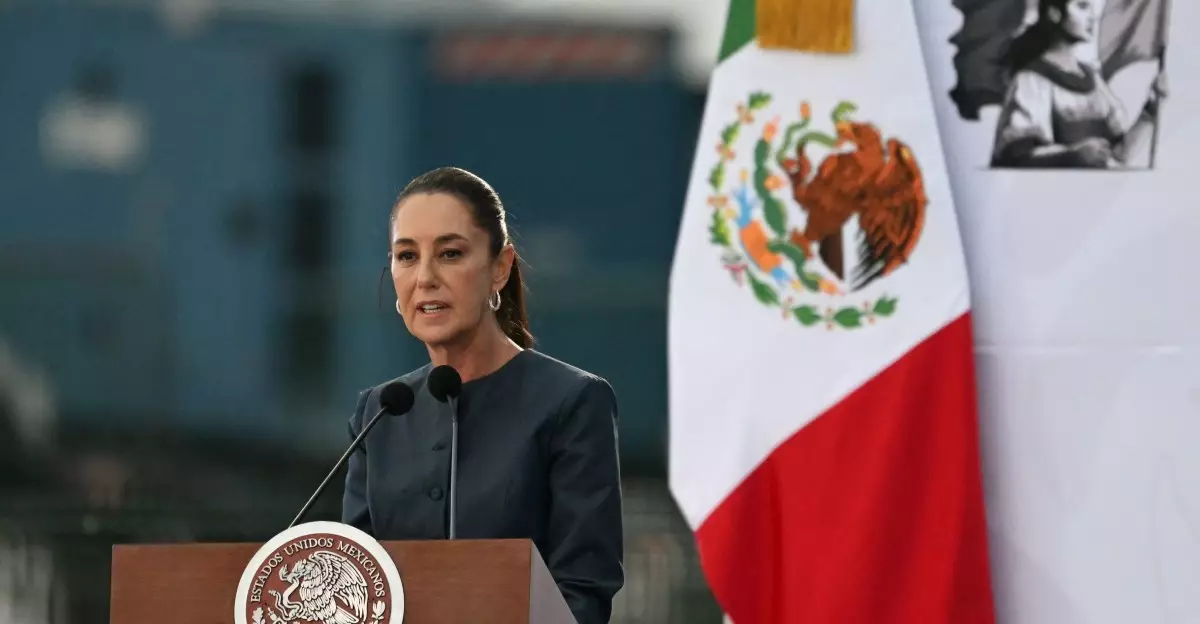In an age where information and perception shape geopolitical landscapes, the name by which we refer to places holds more weight than one might initially consider. Recent events surrounding the nomenclature of the Gulf of Mexico have escalated into an international dispute pitting Mexico against tech powerhouse Google, all sparked by orders from former President Donald Trump. On February 10, 2020, Google altered its maps to label the Gulf of Mexico as the “Gulf of America” for users outside Mexico. This seemingly innocuous change, however, is steeped in a labyrinth of national pride, political posturing, and the complex relationship between tech companies and government authorities.
Claudia Sheinbaum’s Bold Response
Mexican President Claudia Sheinbaum has stepped onto the public stage, asserting that the name given to international waters transcends any single nation’s authority. The name change is not merely a matter of semantics but a declaration of sovereignty and national identity. By filing a lawsuit against Google, Sheinbaum is voicing a broader sentiment—one that echoes across Latin America regarding the ramifications of U.S. policy on the region. This legal action is not only an attempt to amend the naming injustice but also serves as a rallying cry for Mexicans who view the Gulf as an integral part of their heritage.
In her impassioned address, Sheinbaum emphasized that geographical names hold intrinsic cultural significance. “The part that corresponds to Mexico can’t be renamed,” she stated, asserting that the renaming of the Gulf undermines Mexico’s historical connection to the region. She doesn’t merely oppose a label; she stands against a perceived erasure of Mexican identity from an area that has played a vital role in its history.
Google’s Position: Caught Between Two Nations
Google’s decision to modify the Gulf’s name follows directives issued under the Trump administration, which insisted that U.S. government policy be respected by private companies. The tech giant, which has undergone scrutiny for its influence on public discourse, found itself in a precarious position. Complying with Trump’s directive, it risked alienating Mexican users and governments, but dissenting could provoke backlash in the U.S. market.
This quandary points to an emerging theme: the intersection of technology and international relations. Should tech companies uphold nationalist agendas, or do they have a broader responsibility to represent global perspectives? Google’s stance—one prioritizing U.S. policy—has drawn sharp criticism not only from Mexico but also from observers who question the implications of tech companies acting as extensions of governmental policy.
The Broader Implications of Geographical Naming
This conflict over a name invokes a wider discourse surrounding nationalism and cultural representation. Geographical names have historically served as markers of identity, heritage, and connection to territory. The controversy surrounding the Gulf’s name exemplifies the complex relationship between place and identity, stressing that names cannot merely be changed at will without consequence.
Moreover, Sheinbaum’s lawsuit is not an isolated incident but a reflection of a surge in nationalistic sentiments in various parts of the globe. Countries are increasingly wary of external forces attempting to redefine their identities, and this case encapsulates a struggle against the imposition of foreign ideologies. Names are loaded with power, and their change can alter perceptions, moving from benign to aggressive in a matter of moments.
The Future of Naming: A Delicate Balance
As the legal proceedings unfold, the implications may ripple beyond this single case, signaling an evolving dialogue on the autonomy of nations in a borderless digital landscape. The lawsuit represents a critical inflection point at which international cooperation and understanding could either flourish or fracture.
Claudia Sheinbaum’s determination to reclaim Mexico’s narrative demonstrates a commitment not just to her country, but to an awareness of how names influence not just maps, but the stories societies tell about themselves. As nations navigate the intricacies of identity in a world dominated by technology, the pivotal question remains: Who has the authority to define our shared spaces? The outcome of this case could provide insights that resonate well beyond the boundaries of the Gulf.

